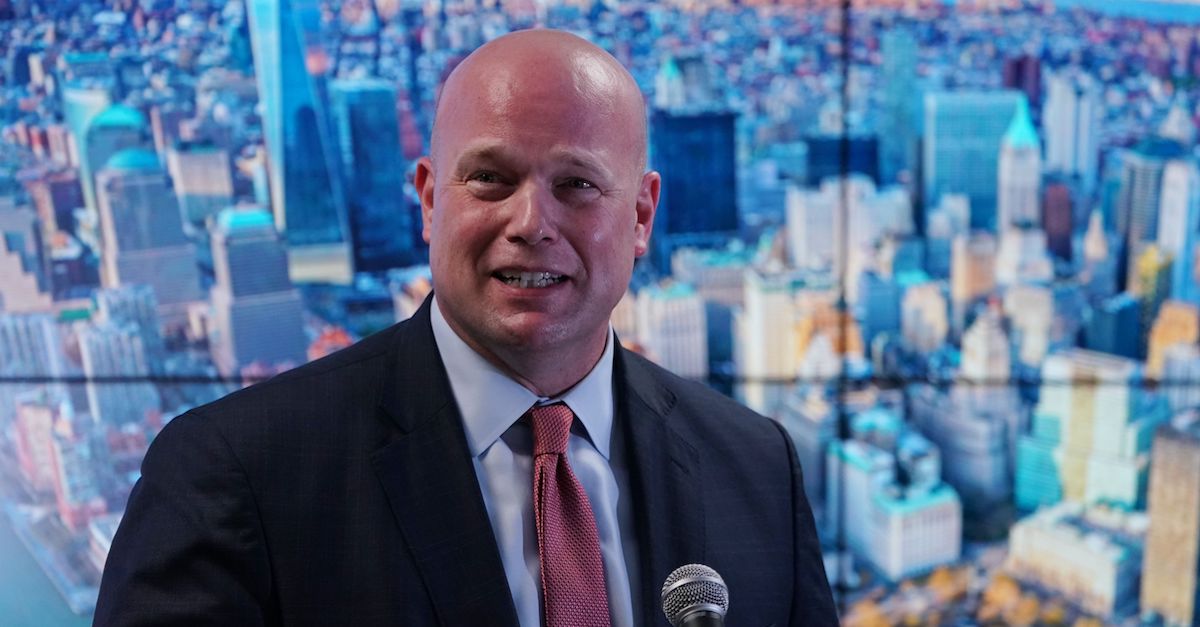
A non-profit government ethics watchdog is demanding an immediate investigation into acting Attorney General of the United States Matthew Whitaker, a day after Whitaker “refused to recuse” himself from overseeing Robert Mueller‘s Russia probe.
Citizens for Responsibility and Ethics in Washington (CREW) sent a letter to the Department of Justice’s Inspector General Michael Horowitz demanding that Horowitz “immediately open an investigation” into whether Whitaker violated the Standards of Ethical Conduct for Employees of the Executive Branch when he ultimately declined to get a formal ruling from the DOJ’s ethics department on the matter of recusal.
An ethics official consulted on the situation determined that recusal was a “close call.” That official also said that if Whitaker did seek a formal recommendation, they would have recommended that he should recuse himself from the Mueller probe out of an “abundance of caution” given the “appearance” of a conflict of interest. More specifically, the official said a reasonable person with knowledge of the relevant facts could question Whitaker’s impartiality.
Whitaker has been under suspicion ever since he replaced Jeff Sessions as acting attorney general. That Sessions resigned in the first place after months and months of being scolded by President Donald Trump for recusing himself from the Russia probe was one reason to cause alarm. The other reason was that Whitaker was quite open about his criticism of the Mueller probe, whether in print or in television interviews, and even suggested that Mueller had “gone too far” — that is, outside the scope of his mandate.
Critics have suggested that Whitaker’s actual or apparent pro-White House partisanship is exactly why he was chosen to lead the DOJ at this legally perilous time for the Trump presidency. As Law&Crime reported Thursday, senior appointed DOJ officials advised Whitaker not to recuse himself based on the aforementioned “appearance” of a conflict of interest. Whitaker accepted that–after members of his own team met with the senior ethics official in question and the ethics official said he would recommend recusal if asked to tender a formal ethics opinion.
CREW argued that “ethics officials determin[ing] that a reasonable person would likely question Acting Attorney General Whitaker’s impartiality if he participated in Special Counsel Mueller’s investigation” should have been enough for Whitaker to recuse himself.
“Making this independent determination triggered a mandatory requirement that Acting Attorney General Whitaker recuse from the investigation. By refusing to do so, Acting Attorney General Whitaker violated the Standards of Conduct,” CREW claimed, citing Section 2635.502 of the Standards of Conduct.
“Acting Attorney General Whitaker […] ignored this determination by career ethics officials and, based on his own evaluation, decided to not recuse from the Special Counsel investigation,” they added. “This attempt to circumvent the process is unsupported by the regulations. According to Assistant Attorney General [Stephen] Boyd, ‘[t]he ultimate decision about whether or not to recuse from a matter in a case such as this rests with the Acting Attorney General.’”
The watchdog group disputed that last line from Boyd.
“The regulation provides that either the employee or the designated agency ethics official acting on his own initiative may determine there is an appearance of loss of impartiality requiring recusal. Once an agency ethics official makes that determination, the employee must recuse and cannot simply override them based on his own evaluation,” they said. “Assistant Attorney General Boyd asserts in his letter that ‘the ethics rules do not require a formal recommendation from the ethics officials,’ but admits the agency ethics officials ‘concluded’ that ‘if a recommendation were sought, they would advise that the Acting Attorney General should recuse.’”
“Assistant Attorney General Boyd appears to be claiming that because no ‘formal’ recommendation was sought or provided, the agency ethics official did not make a determination. The regulation, however, makes no such distinction and does not provide for a ‘formal’ determination,” CREW said.
The appearance of impartiality issue aside, Assistant AG Boyd was quite clear on the point that Whitaker would not have to recuse himself from the Russia probe for the reason Jeff Sessions did.
Jeff Sessions recused himself by citing Title 28, Chapter I, Section 45.2 of the Code of Federal Regulation (CFR) — “Disqualification arising from personal or political relationship.”
Sessions stated that he had to recuse himself from the heading up the Russia probe because he served as a campaign advisor for the Trump campaign.
“That regulation states, in effect, that department employees should not participate in investigations of a campaign if they have served as a campaign advisor,” Sessions said at the time. After a review of all of the relevant facts, Whitaker had no such conflict, Boyd said.
Colin Kalmbacher contributed to this report.
[Image via Don Emmert/AFP/Getty Images]
Have a tip we should know? [email protected]